ODI Grammar Practice Level 5 Unit 1 - answer
ODI 1新教学大纲D

Happy birthday!
isn't=is not/It's=It is
Is it purple? Yes, it is. / No, it isn't. What color is it? It's pink.
13
review
review
review
unit 2
14
15
bird, fish, flower, leaf,butterfly
EFGH efgh
IJKL 3 ABC SONG igloo,jam,key,lemon ijkl
4
map,noodles,octopus, pirate,
MN OP mnop
unit 1(Welcome)
5 ABC SONG queen,robot,sun,tiger
QRST qrst
6
umbrella,vet,window. Oscar, Millie, Rita, Zak blue, green, red, yellow
unit 4
28 My family review review
29
Is he/she a vet? Yes, he/she is. Is he/she an artist? No, he/she isn't. He's/She's a cook.
30
31
dancer, baker, actor, sailor
Mason English ODI Level 1
UNIT Cours e Num ber Songs words sentences letters or phonics
1
(完整版)新编英语教程5册Unit1的答案
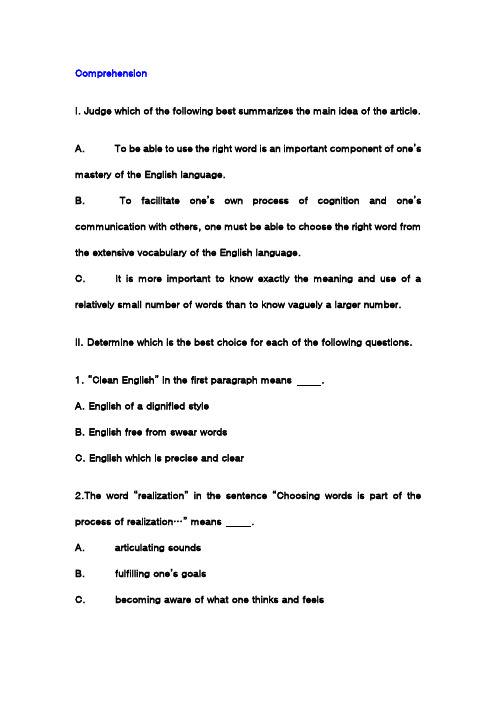
ComprehensionI. Judge which of the following best summarizes the main idea of the article.A. To be able to use the right word is an important component of one’s mastery of the English language.B. To facilitate one’s own process of cognition and one’s communication with others, one must be able to choose the right word from the extensive vocabulary of the English language.C. It is more important to know exactly the meaning and use of a relatively small number of words than to know vaguely a larger number.II. Determine which is the best choice for each of the following questions.1. “Clean English” in the first paragraph means .A. English of a dignified styleB. English free from swear wordsC. English which is precise and clear2.The word “realization” in the sentence “Choosing words is part of the process of realization…” means .A. articulating soundsB. fulfilling one’s goalsC. becoming aware of what one thinks and feels3. The example given in para. 3 of a man searching for the right word for his feelings about his friend illustrates the function words perform in .A. defining out thoughts and feelings for ourselvesB. defining our thoughts and feelings for those who hear usC. both A and B4. The word “cleanly” in the last sentence means .A. squarelyB. clearlyC. neatly5.The examples of the untranslatability of some words given in para. 11 best illustrate which sentence of the paragraph?A. The first sentence.B. The second sentence.C. The third sentence.III. Answer the following questions.1. Which sentence in the first paragraph establishes the link between the driving of a nail and the choice of a word?2. What does the word “this” in sent ence 1, para. 2, refer to?3. Do you agree with the author that there is a great deal of truth in the seemingly stupid question “How can I know what I think till I see what I say”?Why or why not?4. Explain why the word “imprison” in the example given in para. 9, though not a malapropism, is still not the right word for the writer’s purpose.5. What is the difference between “human” and “humane”? And the difference between “human action” and “humane action”, and also that between “human killer” and “humane killer”?6. What does the word “alive” in the sentence “a student needs to be alive to these differences” (para. 9) mean?7. Why is it difficult and sometimes even impossible to translate a word from one language into another as illustrated in para. 11? Supply some such examples with English and Chinese.8. The writer begins his article with an analogy between the unskilled use of the hammer and the improper choice of words. Identify the places where the analogy is referred to in the rest of the article.Language WorkI. Read the following list of words and consider carefully the meaning of each word. Then complete each of the sentences below using the correct form of an appropriate word from the list.Creep Loiter March Meander Pace Patrol Plod Prowl Ramble Roam SaunterShuffle Stagger Stalk Step Stride Strut Stroll Toddle Tramp Tread Trudge Walk1. After the maths examination Fred, feeling exhausted, across the campus.2. The soldiers reached their camp after 15 miles through the deep snow.3. It is pleasant to in the park in the evening.4. After the cross-country race Jack to the changing room.5. Last night when he sleepily to the ringing telephone, he accidentally bumped into the wardrobe.6. We saw him towards the station a few minutes before the train’s departure.7. The old couple through the park, looking for a secluded bench to sit on and rest.8. The newly-appointed general about the room like a latter-day Napoleon.9. Peter whistled happily as he along the beach.10. These old people liked to about the antique ruins in search of a shady picnic spot.11. Many tourists about the mall, windowshopping.12. We were fascinated by the view outside the room----a beautiful verdant meadow and brooks through it.13. Mary used to about the hills and pick wild flowers for her mother.14. Eager to see the pony in the stable, the children down the staircase, their hearts pounding violently.15. The lion had the jungle for a long time before it caught sight of a hare.16. My brother began to when he was ten months old.17. The farmers often let their horses freely in the meadow so that they could eat their fill of grass.18. The patrols were along through the undergrowth when the bomb exploded.19. The thugs were reported to be the streets for women workers who were on their way home after the afternoon shift.20. The first-year students not only learned how to , they were also taught how to take aim and shoot when they had military training.21. Sometimes Tom, our reporter, would up and down the study, deep in thought.22. When he was Third Street, Fred found the little match girl lying dead at the street corner.23. Secretaries hated seeing their new manager in and out of theoffice without even casting a glance at them.24. Mother asked us to lightly so as not to wake Granny.25. The refugees for miles and miles all day hunting for a place to work.26. When the pop singer out of the car, his fans ran to him, eager to get his autograph.27. The laborers on their way home after working in the plantation the whole day.28.The lion was feeling pretty good as he (A) through the jungle. Seeing a tiger, the lion stopped it.“Who is the King of the jungle?” the lion demanded.“You, O lion, are the King of the jungle,” replied the tiger.Satisfied, the lion (B) on, until he came across a large, ferocious-looking leopard.“Who is the King of the jungle?” asked the lion, and the leopard bowed in awe. “You, mighty lion, you are the King of the jungle,” it said humbly and (C) off.Feeling on top of the world, the lion proudly (D) up to a huge elephant an d asked the same question. “Who is the King of the jungle?”Without answering, the elephant picked up the lion, swirled him round in the air, smashed him to the ground and jumped on him.“Look,” said the lion, “there’s no need to get mad just because you didn’t know the answer.”II. Make a list of more specific words for each of the following general terms. For example, for WALK, you could list stride, stroll, saunter, plod, toddle and so on. Give sentences to illustrate how the words may be used.1. SAY2. SEE3. BEVERAGE4. EXCITEMENT5. DELIGHT6. SKILFULIII. In the following sentences three alternatives are given in parentheses for the italicized words. Select the one which you think is most suitable in the context.1. A clumsy (heavy, stupid, unskillful) workman is likely to find fault with his tools.2. As John was a deft (skillful, clever, ready) mechanic, he was hired by the joint-venture in no time.3. The writer made a point of avoiding using loose(vague, unbound, disengaged) terminology in his science fiction.4. We didn’t appreciate his subtle(delicate, tricky, profound) scheme to make money at the expense of the customers.5. Annie Oakley became famous as one of the world’s most precise (accurate, scrupulous, rigid) sharpshooters.6. The government in that newly-independent country has decided to make ashift (alteration, turn, transference) in its foreign policies.7. Misunderstanding arose on account of the vague(undetermined, confused, ambiguous) instructions on the part of the manager.8. If soldiers do not pay scrupulous (exact, vigilant, conscientious) attention to orders they will not defeat the enemy.9. In some areas, the virgin forest has been cut through ignorance (blindness, want of knowledge, darkness) of the value of trees.10. Since many pure metals have such disadvantages (harm, unfavourableness, drawbacks) as being too soft and being liable to rust too easily, they have little use.11. My colleague, Mr. Hill, has a small but well-chosen library, where it is said he spends most of his spare time cultivating(nourishing, tilling, developing) his mind.12. If you think photography is my hobby, your belief is quite mistaken (fraudulent, erroneous, deceitful).13. What appears to the laymen as unimportant (minute, trivial, diminutive) and unrelated facts is often precious to the archaeologist.14. The lounge has a seating capacity of 30 people but it is too dark (dim, dingy, gloomy) to read there.15. These career-oriented women are used to flexible (adaptable, willowy, docile) working hours in the office.16. Only experts with a professional eye can tell the fine(fair, pleasant,subtle) distinction between the two gems.17. The goose quill pen has a great sentimental (tender, emotional, soft) appeal to Emily as it was a gift from her best friend.18. Being thoughtful of and enthusiastic towards others is the essence (gist, kernel, quintessence) of politeness.19. When Iraq destroyed some of its nuclear and chemical weapons, it acted under coercion (repression, concession, compulsion).20. My uncle’s oft-repeated anecdotes of his adventures in Africa were fascinating (catching, pleasing, absorbing ) to listen to.IV. Give one generic term that covers each of the following groups of words.1. artificer, turner, joiner, carpenter, weaver, binder, potter, paper-cutter2. volume, brochure, pamphlet, treatise, handbook, manual, textbook, booklet3. painter, sculptor, carver, poet, novelist, musician, sketcher4. grin, smirk, beam, simper5. donation, subscription, alms, grant, endowment6. bandit, poacher, swindler, fraud, embezzler, imposter, smuggler7. nibble, munch, devour, gulp8. drowse, doze, slumber, hibernate, coma, rest, nap9. manufacture, construct, weave, compose, compile10. ancient, antique, old-fashioned, obsolete, archaic11. slap, tap, pat, thump, whack12. alight, descend, dismount, disembarkV. Fill in each blank with an appropriate word.In discussing the relative difficulties of analysis which the exact and inexact sciences face, let me begin with an analogy. Would you agree that swimmers are (1) skilful athletes than runners (2) swimmers do not move as fast as runners? You probably would (3) . You would quickly point out (4) water offers greater (5) to swimmers than the air and ground do to (6) Agreed, that is just the point. In seeking to (7) their problems, the social scientists encounter (8) resistance than the physical scientists. By (9) I do not mean to belittle the great accomplishments of physical scientists who have been able, for example, to determine the structure of the atom (10) seeing it. That is a tremendous (11) yet (12) many ways it is not so difficult as what the social scientists are expected to (13) . The conditions under which the social scientists must work would drive a (14) scientist frantic. Here are five of (15) conditions. He can perform (16) experiments; he cannot measure the results accurately; he (17) control the conditions surrounding (18) experiments; he is of the expected to get quick results(19) slow-acting economic forces; and he must work with people,(20) with inanimate objects…VI. Following Warner’s model of establishing an analogy between two dissimilar things, write a passage, discussing the learning of a foreign language. You are supposed to use an analogy to help you explain. For instance, you may compare the learning of a foreign language to that of swimming, bike-riding, etc.UNIT 1 TEXT 1Exercises KeysComprehension:I. B ;II. 1.C 2.C 3.C 4.A 5.C ;III. 1. “So with language; …firmly and exactly.”2. Getting the word that is completely right for the writer’s purpose.3. Yes, I do. It sounds irrational that a person does not know what he himself thinks before he sees what he says. But as a matter of fact, it is quite true that unless we have found the exact words to verbalize our own thoughts we can never be very sure of what our thoughts are; without words, our thoughts cannot be defined or stated in a clear and precise manner.4. “Malapropism” means the unintentional misuse of a word by confusing it with one that resembles it, such as human for humane, singularity for singleness. But the misuse of “imprison” is a different case. It is wronglychosen because the user has failed to recognize its connotation.5. human=of, characterizing, or relating to manhumane=characterized by kindness, mercy, sympathyThus: human action=action taken by man; humane action=merciful action; human killer=person that kills humans ; humane killer=that which kills but causes little pain6. sensitive, alert7. Those are words denoting notions which are existent only in specific culture, not universally shared by all cultures. English words difficult to be turned into Chinese: privacy, party, lobby (v.), etc. Chinese words difficult to be turned into English: 吹风会,粽子,五保户,etc.8. “We don’t have to look far afield to find evidence of bad carpentry.”“It is perhaps easier to be a good craftsman with wood and nails than a good craftsman with word s.”“A good carpenter is not distinguished by the number of his tools, but by the craftsmanship with which he uses them. So a good writer is not measured by the extent of his vocabulary, but by his skill in finding the ‘mot juste’, the word that will hit t he nail cleanly on the head.”Language Work:I. 1. shuffled/trudged 2. trudging 3. stroll 4. staggered 5. staggered 6. striding 7. strolled 8. strutted 9. sauntered/strolled 10. ramble/roam 11.loitered 12. meandering 13. roam 14. crept 15. prowled 16. toddle 17. roam 18. creeping 19. prowling 20. march 21. pace 22. patrolling 23. stalking 24. tread 25. tramped 26. stepped 27. plodded 28. A. prowled/strutted B. strolled/sauntered C. walked/crept D. marched/struttedII.1.SAY: speak, tell, declare, pronounce, express, state, argue, affirm, mention, allege, recite, repeat, rehearse2. SEE: behold, look at, glimpse, glance at, view, survey, contemplate, perceive, notice, observe, discern, distinguish, remark, comprehend, understand, know3. BEVERAGE: liquor, wine, beer, tea, coffee, milk drink, soft drink4. EXCITEMENT: agitation, perturbation, commotion, disturbance, tension, bustle, stir, flutter, sensation5. DELIGHT: joy, gladness, satisfaction, charm, rapture, ecstasy, pleasure, gratification6. SKILFUL: apt, ingenious, handy, ready, quick, smart, expert, capable, able, gifted, talented, dexterous, cleverIII. 1. clumsy----unskillful 2. deft----skillful 3. loose----vague 4. subtle----tricky 5. precise----accurate 6. shift----alteration 7. vague----ambiguous8. scrupulous----conscientious 9. ignorance----want of knowledge 10. disadvantages----drawbacks 11. cultivation----developing 12.mistaken----erroneous 13. unimportant----trivial 14. dark----dim 15. flexible----adaptable 16. fine----subtle 17. sentimental----emotional 18. essence----quintessence 19. coercion----compulsion 20. fascinating----absorbingIV. 1. craftsman 2. book/publication 3. artist 4. smile 5. contribution 6. law-breaker 7. eat 8. sleep 9. make 10. old 11. hit 12. get offV. 1. less 2. because/since/as 3. not 4. that 5. resistance 6. runners 7. solve 8. greater/more 9. that 10. without 11. achievement/feat 12. in 13. do 14. physical 15. those 16. few 17. cannot 18. the 19. with 20. not。
ODI Grammar Practice Level 5 Welcome - answer

Level 5–WelcomePast tense with regular & irregular verbsA.Read and choose. (20%)( C ) 1. He ________ English very hard last night.A. studiesB. studysC. studied( A ) 2. Did Peter _________ his room two weeks ago?A. cleanB. cleansC. cleaned( C ) 3. They ________ to their grandpa’s house yesterday.A. goB. goedC. went( B ) 4. We _______ tennis together last week.A. playB. playedC. plaiedB.Put the verbs in brackets into the present simple or past simple. (35%)Tony __had__ (have) a great day yesterday. He __went__ (go) to the movies with his mom. Then, he __played__ (play) the computer games in the afternoon. He _watched_ (watch) TV in the evening. But he ___is___ (be) very busy today. He _has_ (have) to study math in the morning. After that, his mom __wants___ (want) him to play the piano in the afternoon. Poor Tony, he can’t go out to play today.C.Answer the questions. (45%)1.What did Sally do last night? (listen to music)___She listened to music last night._______________________________2.What did Sam do last Sunday? (practice the piano)___He practiced the piano last Sunday.____________________________3.What did they do yesterday? (study math with me)___They studied math with me yesterday.__________________________4.Where did you go two days ago? (go to the library)___I went to the library two days ago._____________________________5.What did you do last night?___The answer may vary._______________________________________© 2012 by Pearson Education, Inc. Permission granted to reproduce for classroom use.。
八上Unit5 grammar1

八(上) Unit 5 Grammar(1)导学案班级姓名主备人:赵洁(小)审核人:丁晓红编号 004 上课时间 2013.11第一部分:明确目标Aims【学习目标Learning aims】(1)掌握并能正确使用may来表示可能性并了解may的其他相关用法(2)了解并复习其他情态动词【学习重点Important points】(1)掌握并能正确使用may来表示可能性并了解may的其他相关用法(2)了解并复习其他情态动词第二部分:前置学习Preview【自学内容】自主学习书P61相关内容。
完成书p61练习。
【前置作业】一、情态动词may的用法■表示推测:可能It may/might rain this afternoon. 今天下午可能会下雨He may come, or he may not. 他可能来,也可能不来。
She may still be waiting for us. 她可能还在等我。
注意:may表示可能性时,主要用于肯定句,不能用于疑问句。
在否定句中,may not只表示“也许不...,可能不...”;表示“不可能”,只能用can’t。
如:He may not come today, for it’s raining. 今天他可能不会来,因为在下雨。
He cannot come today, for he has gone to America. 他今天不可能来,因为他去美国了。
■表示允许:可以(1)—May/Might/Can I come in? 我可以进来吗?肯定回答—Yes, please./ Of course. /Yes, you can.否定回答---No, you can’t. Please don’t.(2)—May I go now?我可以去吗?肯定回答—Yes, you may. 可以。
否定回答—No, you mustn’t/can’t. 不可以去。
—You’d better not. 你最好不去。
人教版高中英语必修5 Unit 1 Grammar 学案
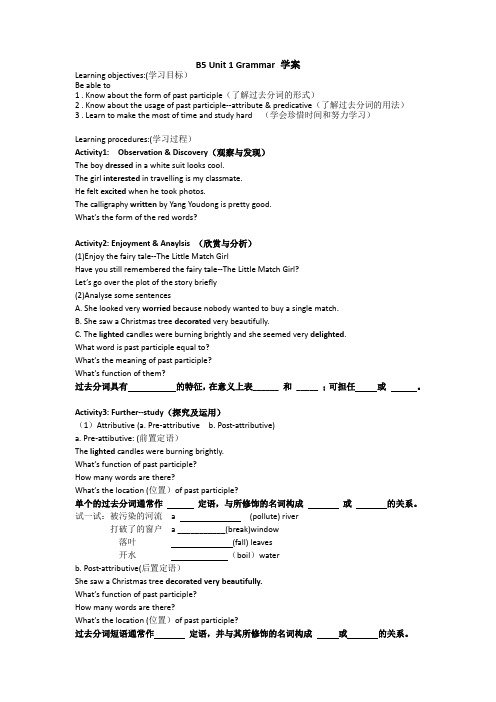
B5 Unit 1 Grammar 学案Learning objectives:(学习目标)Be able to1 . Know about the form of past participle(了解过去分词的形式)2 . Know about the usage of past participle--attribute & predicative(了解过去分词的用法)3 . Learn to make the most of time and study hard (学会珍惜时间和努力学习)Learning procedures:(学习过程)Activity1: Observation & Discovery(观察与发现)The boy dressed in a white suit looks cool.The girl interested in travelling is my classmate.He felt excited when he took photos.The calligraphy written by Yang Youdong is pretty good.What’s the form of the red words?Activity2: Enjoyment & Anaylsis (欣赏与分析)(1)Enjoy the fairy tale--The Little Match GirlHave you still remembered the fairy tale--The Little Match Girl?Let’s go over the plot of the story briefly(2)Analyse some sentencesA. She looked very worried because nobody wanted to buy a single match.B. She saw a Christmas tree decorated very beautifully.C. The lighted candles were burning brightly and she seemed very delighted.What word is past participle equal to?What’s the meaning of past participle?What’s function of them?过去分词具有的特征,在意义上表______ 和_____ ;可担任或。
ODI Grammar Practice Level 2 Welcome - answer

Level 2–Welcomewhat time / prepositions of timeA.Write numbers from 1-12. (24%)1.one2.two3.three4.four5.five6.six7.seven 8.eight 9.nine 10. ten 11. eleven 12. twelveB.Write questions and answers. (36%)e.g. what time? / 3 / eat cookies-> What time is it? It’s three o’clock. It’s time to eat cookies.1.what time? / 6 / get up____What time is it? It’s six o’clock. It’s time to get up.___________________2.what time? / 7 / eat breakfast____ What time is it? It’s seven o’clock. It’s time to eat breakfast.___________3.what time? / 8 / go to school____ What time is it? It’s eight o’clock. It’s time to go to school.____________4.what time? / 4 / go home____ What time is it? It’s four o’clock. It’s time to go home.________________5.what time? / 5 / eat dinner_____What time is it? It’s five o’clock. It’s time to eat dinner._______________6.what time? / 9 / go to bed____ What time is it? It’s nine o’clock. It’s time to go to bed._______________C.Look at Lindy’s schedule.time activity time activity7:00 wake up 12:00 eat lunch8:00 eat breakfast 13:00 go to the library9:00 play with pets 15:00 go homee.g. 7:00 / wake up -> Lindy wakes up at seven o’clock.1.8:00 / eat breakfast -> __Lindy eats breakfast at eight o’clock._________________2.9:00 / play with her pets -> __Lindy plays with her pets at nine o’clock.__________3.12:00 / eat lunch -> __Lindy eats lunch at twelve o’clock._____________________4.13:00 / go to the library -> __Lindy goes to the library at 1 o’clock._______________5.15:00 / go home -> __Lindy goes home at 3 o’clock._________________________6.Does Lindy wake up at six o’clock?____No, she doesn’t. She wakes up at seven o’clock.____________________________7.Does Lindy eat breakfast at eight o’clock?____Yes, she does. She eats breakfast at eight o’clock.__________________________8.Does Lindy eat lunch at one o’clock in the afternoon?____No, she doesn’t. She eats lunch at twelve o’clock.__________________________9.Does Lindy go to the playground at one o’clock in the afternoon?____No, she doesn’t. She goes to the library at one o’clock in the afternoon.________10.Does Lindy go home at three o’clock in the afternoon?____Yes, she does. She goes home at three o’clock in the afternoon.______________。
ODI Grammar Practice Level 3 Unit 6 - was - answer
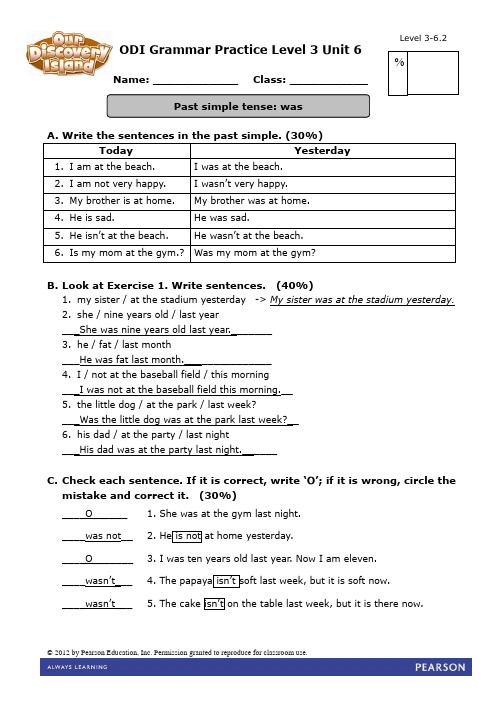
Name: ____________ Class: ___________
Level 3-6.2
%
Past simple tense: was A. Write the sentences in the past simple. (30%) Today
© 2012 by Pearson Education, Inc. Permission granted to reproduce for classroom use.
Yesterday
B. Look at Exercise 1. Write sentences.
2. she / nine years old / last year ___She was nine years old last year._______ 3. he / fat / last month ___He was fat last month._______________ 4. I / not at the baseball field / this morning
C. Check each sentence. If it is correct, write ‘O’; if it is wrong, circle the mistake and correct it. (30%)
____O______ ____was not__ ____O_______ ____wasn’t___ ____wasn’t___ 1. She was at the gym last night. 2. He is not at home yesterday. 3. I was ten years old last year. Now I am eleven. 4. The papaya isn’t soft last week, but it is soft now. 5. The cake isn’t on the table last week, but it is there now.
高中英语选修五:M5U1第四课时grammar usage 课件
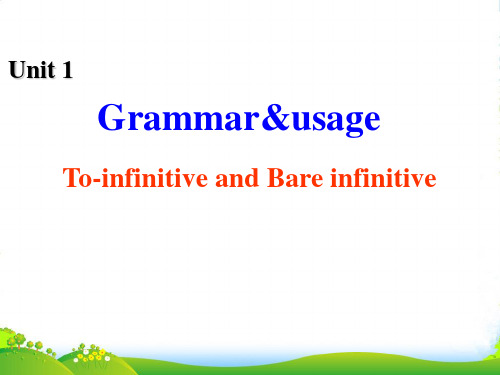
Different functions of To-infinitive
3)常与不定式做宾语连用的动词有:want, hope, wish, offer, fail, plan, learn, pretend, refuse, manage, help, agree, promise, prefer, 如果不定式(宾语)后面有宾语补足语, 常用it作形式宾语,真正的宾语(不定式)后置,放在 宾语补足语后面,如:
Different forms of To-infinitive
2)进行式:不定式的进行式所表示的动作 与谓语动词动作同时发生,例如:
The boy pretended _t_o_b_e__st_u_d_y_i_n_g_h__a_rd____ (在努力学习).
He seems _to__b_e_r_e_a_d_i_n_g_________ (正在看 书) in the room.
force, call on, wait for, invite. 有些动词如make, let, see, watch, hear, feel, have等 与不带有to的不定式连用,但改为被动语态时, 不定式要加to, 如: I saw him cross the road.
→ He was seen _t_o__c_r_o_s_s_t_h_e__r_o_a_d____ .
Different functions of To-infinitive
1)To finish the work in ten minutes is very hard.
高二英语必修五_Unit1_Grammar_优教学案(二)
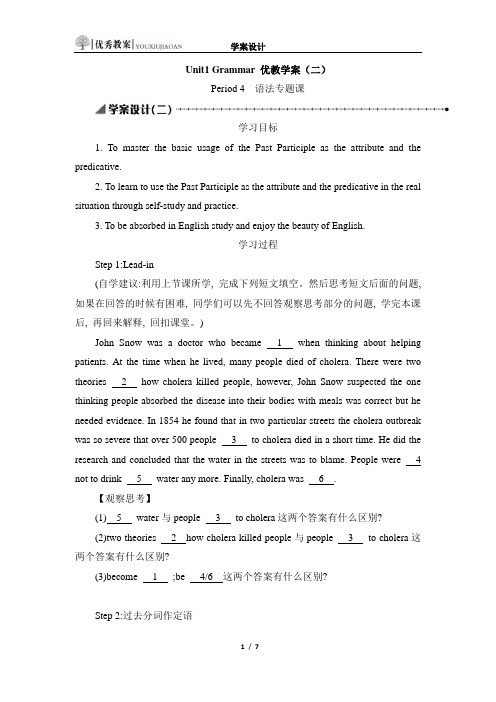
Unit1 Grammar 优教学案(二)Period 4语法专题课学习目标1. To master the basic usage of the Past Participle as the attribute and the predicative.2. To learn to use the Past Participle as the attribute and the predicative in the real situation through self-study and practice.3. To be absorbed in English study and enjoy the beauty of English.学习过程Step 1:Lead-in(自学建议:利用上节课所学, 完成下列短文填空。
然后思考短文后面的问题, 如果在回答的时候有困难, 同学们可以先不回答观察思考部分的问题, 学完本课后, 再回来解释, 回扣课堂。
)John Snow was a doctor who became 1when thinking about helping patients. At the time when he lived, many people died of cholera. There were two theories 2how cholera killed people, however, John Snow suspected the one thinking people absorbed the disease into their bodies with meals was correct but he needed evidence. In 1854 he found that in two particular streets the cholera outbreak was so severe that over 500 people 3to cholera died in a short time. He did the research and concluded that the water in the streets was to blame. People were 4 not to drink 5water any more. Finally, cholera was 6.【观察思考】(1)5water与people 3to cholera这两个答案有什么区别?(2)two theories 2how cholera killed people与people 3to cholera这两个答案有什么区别?(3)become 1;be 4/6这两个答案有什么区别?Step 2:过去分词作定语a lost animal一只迷路的动物 a used stamp一枚用过的邮票an injured finger一根受伤的手指 a broken coin一枚破损的硬币a lighted candle一支点燃的蜡烛(1)So many thousands of terrified people died every time there was an outbreak.(2)He immediately told the astonished people in Broad Street to remove the handle from the pump so that it could not be used.(3)The water companies were instructed not to expose people to polluted water any more.【归纳总结】单个的过去分词作定语时一般兼有和的意义, 常放在被修饰词的。
- 1、下载文档前请自行甄别文档内容的完整性,平台不提供额外的编辑、内容补充、找答案等附加服务。
- 2、"仅部分预览"的文档,不可在线预览部分如存在完整性等问题,可反馈申请退款(可完整预览的文档不适用该条件!)。
- 3、如文档侵犯您的权益,请联系客服反馈,我们会尽快为您处理(人工客服工作时间:9:00-18:30)。
Level 5–1
do & does / look like / be like
A.Read and choose. (20%)
( B ) 1. What _________ he look like? A. do B. does C. is ( C ) 2. What ________ they like? They’re tall. A. do B. does C. are ( B ) 3. Sam _____ like his father. He has blue eyes. A. does B. looks C. has ( C ) 4. _______ Ben like? A. What B. What do C. What’s
B.Correct the mistakes. (20%)
_like___ 1. A: What does Tom look likes? B: He has short hair and green eyes.
_looks__ 2. Peter look like his dad. They all have long legs and brown hair.
_do____ 3. A: What are they look like? B: They have straight hair and blue eyes.
_has___ 4. A: What does Fred look like? B: He have spiky hair and black eyes.
C.Write questions and answers. (60%)
e.g. Sally / be like? / good looking -> What is Sally like? She is good-looking.
Harry / look like? / a beard and light hair
-> What does Harry look like? He has a beard and light hair.
1.Oscar / look like? / short hair and glasses
___What does Oscar look like? He has short hair and glasses._________________
2.Jim and Ted / be like? / talkative and clever
___What are Jim and Ted like? They are talkative and clever.__________________
3.you / look like? / thin and young
___What do you look like? I am thin and young.___________________________
4.Jane / be like? / bossy but hard-working
___What is Jane like? She is bossy but hard-working.________________________
5.Kate’s mom / be like? / kind and helpful
___What is Kate’s mom like? She’s kind and helpful.________________________
6.they / look like? / handsome and friendly
___What do they look like? They’re handsome and friendly._________________ © 2012 by Pearson Education, Inc. Permission granted to reproduce for classroom use.。
